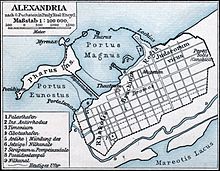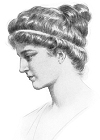Hypatia
370? - 415
Written by Ginny Adair, Class of 1998 (Agnes Scott College)
The life of Hypatia was one enriched with a passion for knowledge. Hypatia was the daughter of Theon, who was considered one of the most educated men in Alexandria, Egypt. Theon raised Hypatia in a world of education. Most historians now recognize Hypatia not only as a mathematician and scientist, but also as a philosopher.
Historians are uncertain of different aspects of Hypatia's life. For example, Hypatia's date of birth is one that is highly debated. Some historians believe that Hypatia was born in the year 370 AD. On the other hand, others argue that she was an older woman (around 60) at the time of her death, thus making her birth in the year 355 AD.
Throughout her childhood, Theon raised Hypatia in an environment of thought. Historians believe that Theon tried to raise the perfect human. Theon himself was a well known scholar and a professor of mathematics at the University of Alexandria. Theon and Hypatia formed a strong bond as he taught Hypatia his own knowledge and shared his passion in the search for answers to the unknown. As Hypatia grew older, she began to develop an enthusiasm for mathematics and the sciences (astronomy and astrology).
Most historians believe that Hypatia surpassed her father's knowledge at a young age. However, while Hypatia was still under her father's discipline, he also developed for her a physical routine to ensure for her a healthy body as well as a highly functional mind. In her education, Theon instructed Hypatia on the different religions of the world and taught her how to influence people with the power of words. He taught her the fundamentals of teaching, so that Hypatia became a profound orator. People from other cities came to study and learn from her.
Hypatia's studies included astronomy, astrology, and mathematics. References in letters by Synesius, one of Hypatia's students, credit Hypatia with the invention of the astrolabe, a device used in studying astronomy. However, other sources date this instrument back at least a century earlier. Claudius Ptolemy wrote extensively on the projection used on the plane astrolabe, and Hypatia's father wrote an astrolabe treatise that was the basis for much of what was written later in the Middle Ages. Hypatia did teach about astrolabes as Synesius had an instrument made that was arguably a form of astrolabe.
Hypatia was known more for the work she did in mathematics than in astronomy, primarily for her work on the ideas of conic sections introduced by Apollonius. She edited the work On the Conics of Apollonius, which divided cones into different parts by a plane. This concept developed the ideas of hyperbolas, parabolas, and ellipses. With Hypatia's work on this important book, she made the concepts easier to understand, thus making the work survive through many centuries. Hypatia was the first woman to have such a profound impact on the survival of early thought in mathematics.
Hypatia lived in Alexandria when Christianity started to dominate over the other religions. In the early 390's, riots broke out frequently between the different religions. Cyril, a leader among the Christians, and Orestes, the civil governor, opposed each other. Hypatia was a friend of Orestes and it is believed that Cyril spread virulent rumors about her. In 415 AD, on Hypatia's way home, a mob attacked her, stripped her and killed her with pieces of broken pottery. Later, the mob dragged her through the streets.
Hypatia's life ended tragically, however her life's work remained. Later, Descartes, Newton, and Leibniz expanded on her work. Hypatia made extraordinary accomplishments for a woman in her time. Philosophers considered her a woman of great knowledge and an excellent teacher.
December, 1995
References
- Deakin, Michael. "Hypatia and Her Mathematics," The American Mathematical Monthly, 101, No. 3 (March 1994), 234-243. Available at the MAA web site http://www.maa.org/pubs/calc_articles.html or Jstor (subscription required).
- Deakin, Michael. Hypatia of Alexandria, Mathematician and Martyr, Prometheus Books, Amherst, NY, 2007.
- Hypatia of Alexandria, transcript of a talk by Michael Deakin on August 3, 1997, archived athttp://www.abc.net.au/radionational/programs/ockhamsrazor/hypatia-of-alexandria/3565116
- The Primary Sources for the Life and Work of Hypatia of Alexandria by Michael Deakin.
- Knorr, Wilbur. "On Hypatia of Alexandria," in Textual Studies in Ancient and Medieval Geometry, Birkhauser, 1989.
- Dzielska, Maria. Hypatia of Alexandria. Cambridge: Harvard University Press, 1995.
- Osen, Lynn M. Women in Mathematics. United States: Massachusetts Institute of Technology Press, 1974.
- Perl, Teri. Biographies of Women Mathematicians and Related Activities. United States: Addison-Wesley, 1978.
- Koch, Laura Coffin. "Hypatia," Notable Women in Mathematics: A Biographical Dictionary, Charlene Marrow and Teri Perl, Editors, Greenwood Press, 1998, 94-97
- Neugebauer, Otto A., "The Early History of the Astrolabe", from "Astronomy and History: Selected Essays", Springer-Verlag (1983).
- Cupillari, Antonella, A Biography of Maria Gaetana Agnesi, an Eighteenth-Century Woman Mathematician: With Translations of Some of Her Work from Italian into English, Mellen Press, 2008.
- Longfellow, Ki. Flow Down Like Silver: Hypatia of Alexandria (a novel), Eio Books, 2009.
- Dictionary of Scientific Biography
- Biography, MacTutor History of Mathematics Archives
- Howard Landman's collection of Hypatia WWW links at http://www.polyamory.org/~landman/Hypatia/




